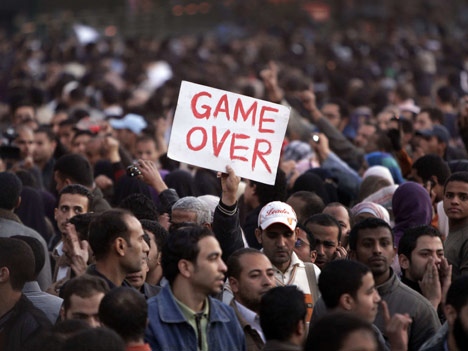Subscribe to ShahidulNews
`Go, Mubarak go!’ ?USA’s tottering user-friendly tyrants…
By Rahnuma Ahmed
Having grown up amidst popular uprisings, such as the Civil Disobedience movement in 1969, and much later, having participated in mass uprisings, foremost among them, the one against general HM Ershad’s regime in 1990, witnessing scenes of the unfolding peoples’ revolt against the US-bolstered 30-year old Mubarak dictatorship in Egypt, relayed live, courtesy of al-Jazeera television, is, well…, just great!

Every passing moment contributes to our history on earth, but some moments are crucial for they change history, writes Ashraf Ezzat, medical doctor and political analyst, from Alexandria. What the world now witnesses in Egypt, is not only the crumbling down of a dictatorship that stifled Egyptians for decades but “a whole age of authoritarianism in the Arab world.”
It all began in Tunisia. Mohammed Bouazizi, 26, a vegetable-seller, set himself on fire on December 17, 2010 after police confiscated his unlicensed produce stand; he died on Jan 3. Protests against unemployment, police brutality and the regime’s corruption increased, leading to the toppling of president Zine al-Abidine Ben Ali’s regime, a dictator who had ruled for 23 years, was re-elected president five times, each time winning 99.9%-89.62% votes, who amended the constitution in 2002 to allow the president (read, himself) to stay in power until the age of 75, to be re-elected unlimited times. After a 29 day popular uprising, Ben Ali, who headed “one of the Arab world’s most repressive regimes” (Guardian, January 15, 2011), ?who was a “stalwart US ally” (Foreign Policy, February 5, 2011)?was forced to flee, to take refuge in Saudi Arabia. Prime minister Mohamed Ghannouchi took over as interim president as soldiers guarded ministries, public buildings and the state TV building, as security forces were authorised to fire live rounds.
“Freedom is expensive and my brother paid the price of freedom,” said Salem, Bouazizi’s brother. “My brother has become a symbol of resistance in the Arab world.”
So true he was, as instances of self-immolation followed soon. An Egyptian man set himself alight near the parliament, a Mauritanian in front of the presidential palace in Nouakchott, the capital, while four unemployed young men reportedly immolated themselves in Algeria.
Continue reading “PART I THE END OF AUTHORITARIANISM IN THE ARAB WORLD?”
